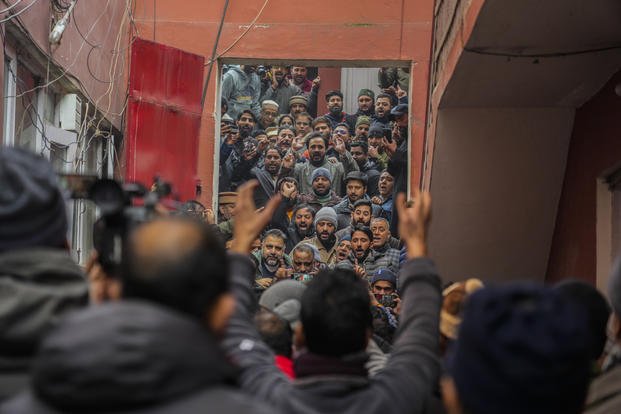NEW DELHI (AP) — Anger has spread in some remote parts of Indian-controlled Kashmir after three civilians were killed while in army custody, officials and residents said Saturday.
Locals said the Indian army detained at least eight civilians on Friday for questioning, the day after rebels fighting against Indian rule ambushed two army vehicles in the southern Poonch district, killing four soldiers and wounding three others.
The districts of Poonch and Rajouri are close to the highly militarized line of control that divides the disputed Himalayan region between India and Pakistan.
Locals accused army personnel of torturing the three to death in a nearby military camp. The bodies were later handed to the local police who in turn contacted the families. Residents said the bodies bore marks of severe torture.
The five other detainees were taken to an army hospital after they were severely tortured, their families said.
Mohammed Younis, a resident, said soldiers came to his Topa Peer village in Poonch district Friday morning and detained nine villagers, including his two brothers and a cousin. An elderly man was let go, he said, but the others were ruthlessly beaten and electrocuted.
“My two brothers and a cousin are badly hurt due to torture. They are being treated in an army hospital,” Younis said after seeing one of his brothers.
Videos reportedly showing the torture of detained civilians spread online hours after their incarceration, triggering widespread anger.
Authorities cut off internet services on smart devices in Poonch and Rajouri on Saturday morning, a common tactic to dispel possible protests and discourage dissemination of the videos.
Lt. Col. Suneel Bartwal, an Indian army spokesman, said a search operation for the militants responsible for the ambush has been ongoing since Thursday evening, adding he had no “input” about the circumstances surrounding the death of the three civilians.
The government’s information department wrote on X, formerly Twitter, that after medical formalities, a legal action “has been initiated by the appropriate authority” into the killings without offering explanation. It said authorities also announced financial assistance to the victims’ families.
Senior police and civil officials visited the village and supervised the burials. Local officials said police would investigate the incident, in an attempt to pacify the villagers.
Protests erupted in Srinagar, the region's main city, with at least three pro-India Kashmiri political parties staging demonstrations against the killings.
Mehbooba Mufti, the region’s former top elected official who was once an ally of Prime Minister Narendra Modi’s ruling party, said the recent acquittal of an army officer in the killing of three civilians in a staged gunbattle three years back had “emboldened” the army, “creating a false precedent among the forces that they can operate without restraint.”
In 2020, the Indian army killed three young men from Rajouri in a fake gunfight and portrayed them as Pakistani terrorists. But after an outcry and a police investigation, the Indian military in a rare admission acknowledged wrongdoing and that its soldiers exceeded their legal powers granted to them under the Armed Forces Special Powers Act.
The Indian army’s internal court had sentenced an officer to life imprisonment for the killings. However, a military tribunal in November this year suspended his sentence.
The Armed Forces Special Powers Act gives the Indian military in Kashmir sweeping powers to search, seize and even shoot suspects on sight without fear of prosecution. Under the act, local authorities need federal approval to prosecute erring army or paramilitary soldiers in civilian courts.
India has long relied on military force to retain control over the portion of Kashmir it administers and has fought two wars over the territory with Pakistan, which also claims the mountain region as its own.
Militants in the Indian-controlled portion of Kashmir have been fighting New Delhi’s rule since 1989. Most Muslim Kashmiris support the rebels’ goal of uniting the territory, either under Pakistani rule or as an independent country.
India insists the Kashmir militancy is Pakistan-sponsored terrorism. Pakistan denies the charge, and most Kashmiris consider it a legitimate freedom struggle. Tens of thousands of civilians, rebels and government forces have been killed in the conflict.
But the territory has simmered in anger since 2019, when New Delhi ended the region’s semi-autonomy and drastically curbed dissent, civil liberties and media freedoms while intensifying counterinsurgency operations.
While Kashmir Valley, the heart of anti-India rebellion, has witnessed many militants killed in counter-rebel operations, remote Rajouri and Poonch have seen deadly attacks against Indian troops in the past two years. At least three dozen soldiers have been killed in such attacks.











